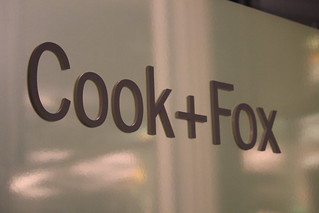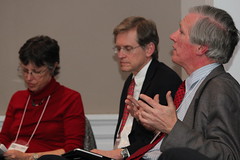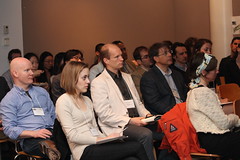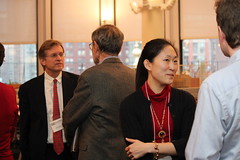 We finished off the Sustainable Business Series on Monday March 12th at Cook+Fox with a packed house to discuss “Sustainable Finance: What does it look like?” The night’s discussions focused on how to infuse a long-term perspective into the financial aspects of business. It also touched on the ways that at either an individual or household level, finance relates to psychology and is based on trust.
We finished off the Sustainable Business Series on Monday March 12th at Cook+Fox with a packed house to discuss “Sustainable Finance: What does it look like?” The night’s discussions focused on how to infuse a long-term perspective into the financial aspects of business. It also touched on the ways that at either an individual or household level, finance relates to psychology and is based on trust.
We had an all-star panel with John Cusack, founder of Gifford Park Associates, Rick Stuckey, a long-time investment professional with many years spent on Wall Street (also a member of our Advisory Board), and Judy Samuelson, Director of Business & Society Planning at the Aspen Institute.
 John started off the night by discussing the need for companies to integrate environmental, social, economic and even ethical issues into their operations. He describes sustainable finance as “the ultimate interdisciplinary area of business,” because it is in all parts of the business world. The trick is in how we change the way financial theory is taught to be less compartmentalized and more interdisciplinary. He discussed how these components (environmental, social, economic, ethical) all affect the bottom line of companies, and for this reason it is important to have leadership that understands these issues and understands that people are the ones making decisions, so it is crucial that people understand business.
John started off the night by discussing the need for companies to integrate environmental, social, economic and even ethical issues into their operations. He describes sustainable finance as “the ultimate interdisciplinary area of business,” because it is in all parts of the business world. The trick is in how we change the way financial theory is taught to be less compartmentalized and more interdisciplinary. He discussed how these components (environmental, social, economic, ethical) all affect the bottom line of companies, and for this reason it is important to have leadership that understands these issues and understands that people are the ones making decisions, so it is crucial that people understand business.
Next, Rick referenced a recent Wall Street Journal article that said that CFOs are becoming more strategists and planners alongside the CEOs of companies, making their role critical to the development of a company’s behavior, a role open to the Bard MBA graduates. He went on to argue that it is hard to define sustainable finance because there is not a definition currently in existence, and all of the real-world examples from history are all examples of the opposite of sustainable finance. To solve this he suggested that we need to tackle both accounting and real world issues from both a corporate level and an investment management-side level.
 Rick closed his talk with a discussion of the barriers to financing climate change projects. These would have to be large projects, and an estimated $1 billion per year in financing, but the market for these bonds has not yet gained traction. Because capital goes to the highest risk-adjusted return, renewables are unable to compete with fossil fuels because of all the government subsidies and unaccounted externalities. He posed the question: can capital markets help, even with these headwinds? And suggested that the answer lies in how we finance future projects, and the market skills that new business leaders have.
Rick closed his talk with a discussion of the barriers to financing climate change projects. These would have to be large projects, and an estimated $1 billion per year in financing, but the market for these bonds has not yet gained traction. Because capital goes to the highest risk-adjusted return, renewables are unable to compete with fossil fuels because of all the government subsidies and unaccounted externalities. He posed the question: can capital markets help, even with these headwinds? And suggested that the answer lies in how we finance future projects, and the market skills that new business leaders have.
Judy finished the night’s discussion talking about the problem of short-termism, which seems to have become the standard after Enron. She explained that the issue facing us today is the challenge of business designed for sustainability vs. a one note financial return, and cited a recent study that said most business executives see pressures for short-term financial results as barriers to making business sustainable. At the Aspen Institute, one of their founding beliefs is that business is the defining institution of our day, so the challenge is how to change the system.
 Judy broke down the system into the three areas that she thinks are the most important: first, she said it was all about incentives—what are we paying people for their practices and how is it trickling down through the system? Next, she said that not all shareholders are the same, and nothing about corporations are democratic so recognizing this is key to how we strategize. And finally, she said that business education is key, it’s all about leadership, and the biggest noise in the system comes from the finance sector so it’s up to academia to create change at the roots.
Judy broke down the system into the three areas that she thinks are the most important: first, she said it was all about incentives—what are we paying people for their practices and how is it trickling down through the system? Next, she said that not all shareholders are the same, and nothing about corporations are democratic so recognizing this is key to how we strategize. And finally, she said that business education is key, it’s all about leadership, and the biggest noise in the system comes from the finance sector so it’s up to academia to create change at the roots.
A general consensus from the group seemed to be that finding innovators in this field and putting the spotlight on them is going to be key going forward, a great note on which to end this inspiring speaker series. Thanks to everyone who participated, to Cook+Fox for the event space, and Ciao for Now catering for the delicious snacks. Stay tuned for future events!
Melissa Provinsal, CEP ’12